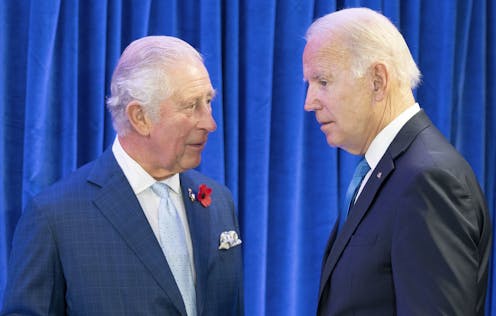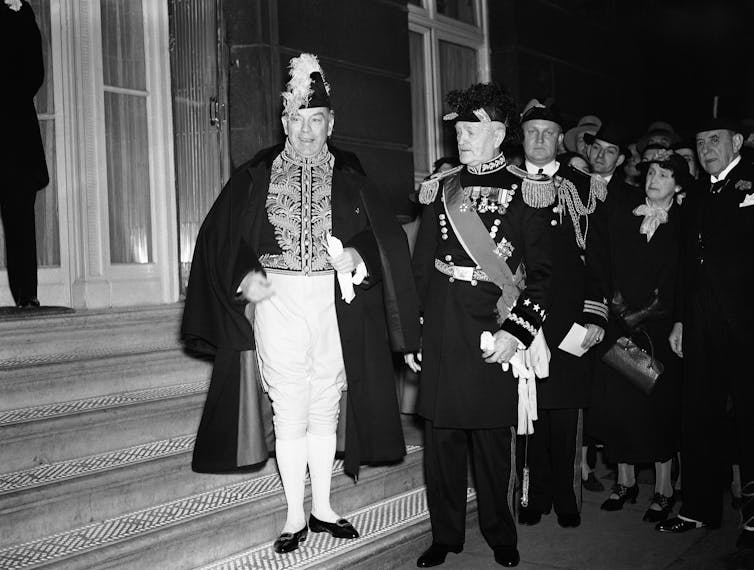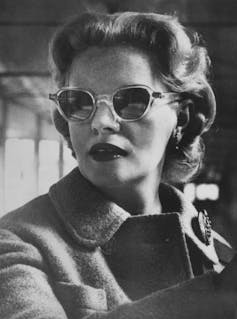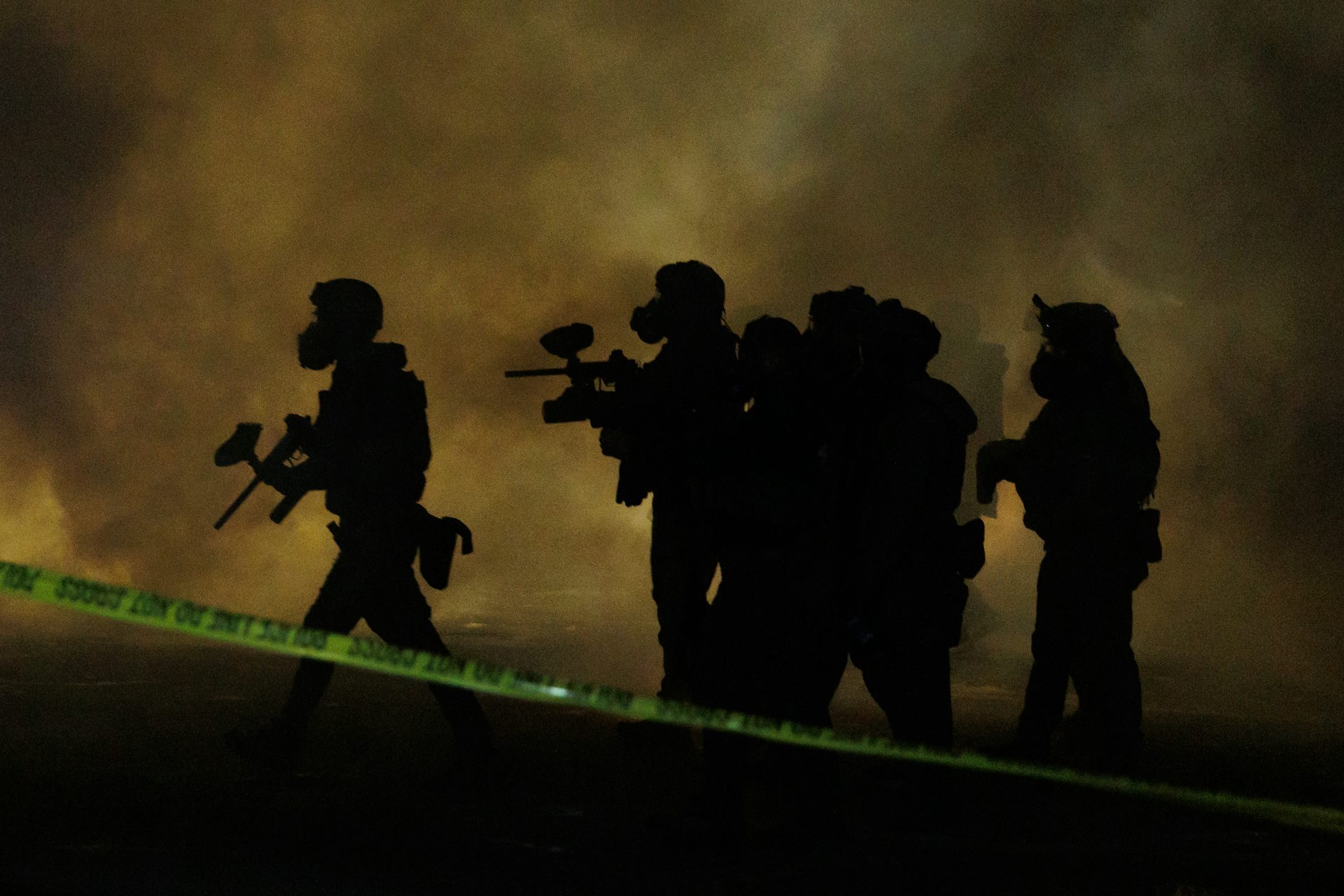Biden's coronation no-show is no snub – more telling is whom he sends to King Charles' big day
No US president has ever attended a British royal coronation – but history shows that they signal intent by whom they choose to go in their stead.

The fact that first lady Jill Biden, but not her husband, President Joe Biden, will be attending King Charles III’s coronation on May 6, 2023, has not gone down too well with sections of the U.K. press. A “royal snub,” screamed headlines, while commentators grumbled about “Irish Joe” and his “hatred” of the Brits.
The truth is, no U.S. president has ever attended a British coronation ceremony. Indeed, American presidents tend to avoid royal ceremonies of all stripes. Biden did attend Queen Elizabeth II’s funeral in September 2022, but that was very much the exception, not the rule.
Given the U.S.’s particular history – and its parting of ways with the U.K. back in 1776 – it’s easy to see why a president might feel uneasy about witnessing the anointing of a new sovereign. No matter how “special” the relationship, some distinctions need to be preserved.
But as a historian of America’s relationship with the U.K. monarchy, I believe it would be wrong to assume that Joe Biden’s absence signals a lack of engagement, or appreciation, for the coronation as a significant global occasion. Jill Biden’s attendance, after all, matters.
What’s more, she will be joined by an American coronation delegation. The composition of the delegation has yet to be announced. But if history is a guide, who is sent across the Atlantic will telegraph particular American ideas and aspirations. The delegation will also reflect the president’s own personal agenda.
Signaling intent
This was true for the delegation President Franklin D. Roosevelt sent to King George VI’s coronation in 1937, staged just two years before hostilities broke out in Europe. That party was headed by General John J. Pershing, commander of the American Expeditionary Forces during World War I, and included James Gerard, former U.S. Ambassador to Germany, and Admiral Hugh Rodman, a former commander-in-chief in the U.S. Navy.

Pershing and Gerard were committed internationalists, eager to use American power to contain European fascism. Gerard had reviewed Hitler’s “Mein Kampf” for The New York Times in 1933, in which he expressed his “fear for the world’s future.” In dispatching both to the coronation, Roosevelt was signaling where he stood on Nazi Germany.
Elevating women
Even more telling is the delegation that President Dwight D. Eisenhower sent to Queen Elizabeth II’s coronation in June 1953. In this postwar moment – marked by escalating tensions with the Soviet Union and the accompanying Red Scare at home – Eisenhower chose his four representatives carefully. Two, General George C. Marshall and General Omar Bradley, were military heavyweights. Marshall, who headed the delegation, had been U.S. Army chief of staff during World War II. More recently, as secretary of state, he had helped implement the Marshall Plan, which provided crucial funding to postwar Europe.
Bradley, likewise, had played a decisive role in the war, and now served as chairman of the U.S. Joint Chiefs of Staff. Eisenhower selected both to convey a clear message about American influence abroad. His third delegate, meanwhile, was Earl Warren, governor of California and a crucial Eisenhower supporter. The president would soon appoint Warren chief justice of the Supreme Court.
Less predictable, though still important, was Eisenhower’s fourth delegate: Fleur Cowles, the fashionable former editor of Flair magazine and wife of the publisher, Mike Cowles.
In some ways, this was Eisenhower’s most inscrutable choice. A self-made woman – she was born Florence Freidman, the daughter of a salesman – Cowles had only recently become a powerful presence in the Republican Party. She and her husband gave generously to Ike’s presidential campaign.

Fleur Cowles’ newcomer status elicited ire in some quarters – as did the fact that Eisenhower had selected a woman at all. “Wouldn’t a G.I. be better able to represent the president?” quipped one grumpy journalist.
But the pick had its own logic. The coronation of Elizabeth II was a female-centered event, and Eisenhower likely recognized this. In choosing Cowles, Eisenhower played into this female narrative, while also signaling his own, sometimes contradictory, aspirations for the modern American woman.
As Eisenhower would explain just a few years later, the process of “recognizing the equality of women” was not yet complete, though he still believed women’s primary role to be that of “central figure in the home.” As some of Cowles’ admirers explained, she embodied this idealized version of the postwar career woman – elegant, ambitious, and yet still committed to her family.
Pinned down on US positions
The composition of Eisenhower’s delegation, then, spoke volumes about the president’s priorities, both at home and abroad.
Once the delegation arrived in London, its role as a diplomatic corps became only more evident. Far from avoiding politics, the delegates sought platforms to broadcast American policies. Marshall, for example, gave a talk at the English-Speaking Union justifying the U.S. military presence in Korea and warning of the dangers of Soviet propaganda.
More informally, the delegation fielded frequent questions from the press about controversial issues and did its best to remain in lockstep with the president. As Cowles recalled of the trip, if she wasn’t “being pin[ned] down” about Sen. Joe McCarthy’s Communist witch hunt, she was being grilled about the impending execution of Julius and Ethel Rosenberg, whose trial on charges of espionage had “been turned into a cause celebre in Europe.” In short, attending the coronation was real work.
So instead of fixating on why Joe Biden isn’t attending, observers on both sides of the pond should focus on the delegation that Jill will be leading. The choices, whenever they’re announced, will tell us much about how President Biden wants to position himself ahead of his 2024 presidential bid.
Arianne Chernock does not work for, consult, own shares in or receive funding from any company or organization that would benefit from this article, and has disclosed no relevant affiliations beyond their academic appointment.
Read These Next
ICE immigration tactics are shocking more Americans as US-Mexico border operations move north
Militarized immigration enforcement used to be confined to near the US-Mexico border, far away from…
‘We want you arrested because we said so’ – how ICE’s policy on raiding whatever homes it wants viol
Since the republic’s beginning, it has been uncontested law that to invade someone’s home, the government…
Your brain can be trained, much like your muscles – a neurologist explains how to boost your brain h
Challenging the brain by exposing it to new situations, tasks and skills can improve its efficiency,…





